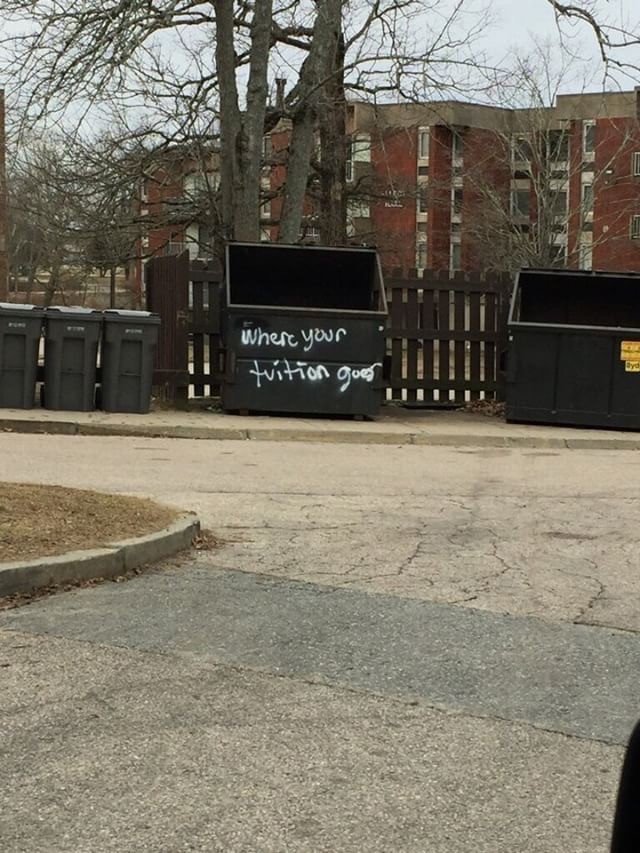Photo by Stephanie Erickson |CIGAR|
A member, or members, of the University of Rhode Island community defaced several buildings and shared spaces on campus with political graffiti.
At this time the University officials and Campus Police have been unable to identify those responsible for this string of vandalism.
The University’s handbook of student conduct prohibits any and all forms of vandalism, “destruction of, damage to, or inappropriate use of property belonging to others.”
Similarly, Rhode Island State Law §11-44-1 mandates that all convicted of the misdemeanor offense of vandalism should pay a fine of no more than $1,000 and serve a maximum of one year in prison.
When the University find the culprits it is almost guaranteed that they will face disciplinary action. Due to the impact of the graffiti, the University could explore legal action and further hold the culprits accountable.
The vandals targeted Memorial Union and spray-painted the slogan “end prison slavery now.” According to Carl Stiles, director of the Memorial Union, described the graffiti as an unnecessary expense for students.
“[The damage affected] a portion of the facility that is maintained through student fees,” said Stiles. “Student fee money will be used to clean the site, repair and repaint as necessary.” Ultimately, Stiles says the vandalism distracts the Memorial Union and the University from providing students with the tools and support to participate in student activism and make the world “a more engaged, just, and equitable place to live, learn, and socialize.”
Ryan Schult, a student living on campus, said he sees the graffiti every morning on his way to class.
“It brings [the issue of intimate exploitation] to my attention,” Schult said. However, he concludes that there are more positive ways of raising awareness.
“If you want to do something about it, don’t voice it in an immature and illegal manner,” said Madelyn Tobin, a first-year student. Tobin, who like Schult, sees raising awareness for this and other important national issues as something positive.
Tobin believes that this form of anonymous activism as something that ultimately undermines the positive activism done by others.
Amy Olson, the executive director of the URI chapter of Hillel, a Jewish student center, said that Hillel was one of several campus locations vandalized by graffiti overnight on Feb. 5, with the words “free Palestine” spray-painted onto the Hillel Center.
Olson said she and her organization was pleased by the response of the University and Campus Police to the vandalism.
University facility staff subsequently removed the graffiti and documented by campus officials. Olson and the Hillel Center felt the “this incident did not warrant further publicity” as it had been dealt with by the University in a prompt and supportive manner.
It is clear that the individual or the group responsible for this string of vandalism targeted many community centers on campus. Not only did the culprits deface the community, they also tried to address complex political issues anonymously with spray-paint rather than getting involved in a meaningful way to help solve these issues.





